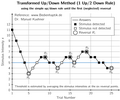Psychophysics
Psychophysics is a sub-discipline of psychology and physics that studies the relationship between physical stimuli and the sensations and perceptions they produce in the human mind. It is a field of study that combines the empirical methodology of physics with the subjective experience of psychology.
History[edit]
The term "psychophysics" was coined by Gustav Fechner, a German experimental psychologist in the 19th century. Fechner was interested in measuring the "soul" and developed methods to quantify the relationship between a physical stimulus and the psychological response it elicited.
Methods[edit]
Psychophysics uses a variety of methods to measure the relationship between physical stimuli and perception. These include:
- Absolute threshold: This is the smallest amount of stimulus that can be detected by a subject. For example, the absolute threshold for vision would be the smallest amount of light that can be seen.
- Difference threshold: This is the smallest difference in stimulus intensity that can be detected. For example, the difference threshold for weight would be the smallest difference in weight that can be felt.
- Signal detection theory: This theory is used to measure the ability to differentiate between informative signals in noise and noise alone.
Applications[edit]
Psychophysics has a wide range of applications, including:
- Clinical psychology: Psychophysics can be used to measure sensory thresholds in patients with neurological disorders.
- Marketing: Companies use psychophysics to test consumer reactions to different product features, such as color, taste, and texture.
- Ergonomics: Psychophysics can help design products that are more comfortable and efficient to use.
See also[edit]
References[edit]
<references />
Ad. Transform your life with W8MD's Budget GLP-1 injections from $75


W8MD offers a medical weight loss program to lose weight in Philadelphia. Our physician-supervised medical weight loss provides:
- Weight loss injections in NYC (generic and brand names):
- Zepbound / Mounjaro, Wegovy / Ozempic, Saxenda
- Most insurances accepted or discounted self-pay rates. We will obtain insurance prior authorizations if needed.
- Generic GLP1 weight loss injections from $75 for the starting dose.
- Also offer prescription weight loss medications including Phentermine, Qsymia, Diethylpropion, Contrave etc.
NYC weight loss doctor appointmentsNYC weight loss doctor appointments
Start your NYC weight loss journey today at our NYC medical weight loss and Philadelphia medical weight loss clinics.
- Call 718-946-5500 to lose weight in NYC or for medical weight loss in Philadelphia 215-676-2334.
- Tags:NYC medical weight loss, Philadelphia lose weight Zepbound NYC, Budget GLP1 weight loss injections, Wegovy Philadelphia, Wegovy NYC, Philadelphia medical weight loss, Brookly weight loss and Wegovy NYC
|
WikiMD's Wellness Encyclopedia |
| Let Food Be Thy Medicine Medicine Thy Food - Hippocrates |
Medical Disclaimer: WikiMD is not a substitute for professional medical advice. The information on WikiMD is provided as an information resource only, may be incorrect, outdated or misleading, and is not to be used or relied on for any diagnostic or treatment purposes. Please consult your health care provider before making any healthcare decisions or for guidance about a specific medical condition. WikiMD expressly disclaims responsibility, and shall have no liability, for any damages, loss, injury, or liability whatsoever suffered as a result of your reliance on the information contained in this site. By visiting this site you agree to the foregoing terms and conditions, which may from time to time be changed or supplemented by WikiMD. If you do not agree to the foregoing terms and conditions, you should not enter or use this site. See full disclaimer.
Credits:Most images are courtesy of Wikimedia commons, and templates, categories Wikipedia, licensed under CC BY SA or similar.
Translate this page: - East Asian
中文,
日本,
한국어,
South Asian
हिन्दी,
தமிழ்,
తెలుగు,
Urdu,
ಕನ್ನಡ,
Southeast Asian
Indonesian,
Vietnamese,
Thai,
မြန်မာဘာသာ,
বাংলা
European
español,
Deutsch,
français,
Greek,
português do Brasil,
polski,
română,
русский,
Nederlands,
norsk,
svenska,
suomi,
Italian
Middle Eastern & African
عربى,
Turkish,
Persian,
Hebrew,
Afrikaans,
isiZulu,
Kiswahili,
Other
Bulgarian,
Hungarian,
Czech,
Swedish,
മലയാളം,
मराठी,
ਪੰਜਾਬੀ,
ગુજરાતી,
Portuguese,
Ukrainian



